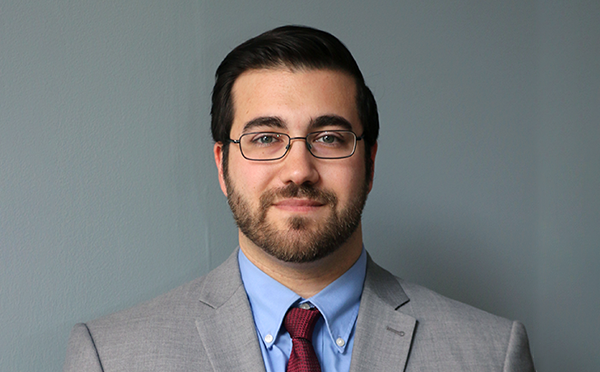Michael Cannella (LAW’14, SPH’15): SPH Instructor and Assistant General Counsel at Mass. Health Connector.
Michael Cannella Is Assistant General Counsel at Massachusetts Health Connector
The SPH alum and instructor says he is “constantly learning new material” in both roles.
Massachusetts “has always been a place where the healthcare sector and the issues around it are very much in focus,” says School of Public Health alum Michael Cannella (LAW’14, SPH’15). “There is a willingness to figure out what is the right thing to do, and not have to struggle through a debate over whether anything needs to be done. In a lot of other places, that foundational question of whether a problem even exists is often where debates live or die.”

This political environment, combined with a desire to work upstream in health law and policy issues, led Cannella to enroll in the JD/MPH dual degree program at the School of Law and SPH, where he received his JD in 2014 and MPH in 2015.
At SPH, he studied health policy and management, as well as health law, bioethics and human rights to better understand the healthcare sector and the nuances of policy analysis. “Getting a law degree doesn’t necessarily teach you how to make judgements about what is good or bad policy,” says Cannella. “You can assess whether something is lawful or unlawful, but that determination is not enough to say whether something is an effective policy. So I knew that marrying this health policy expertise from the School of Public Health with strong legal writing and analysis skills from the Law School would put me on a good career path,” he says.
That path has led him to influential legal roles, as legislative director and counsel for Massachusetts Senator James Welch from 2016-2019, and currently as assistant general counsel at the Massachusetts Health Connector, the Commonwealth’s health insurance marketplace. He also shares his legal knowledge and expertise as the instructor for the Analysis of Current Health Policy Issues course (PM840) at SPH, where students learn to dissect and debate current health policy proposals.
As an assistant general counsel at the Health Connector, Cannella advises the staff on how to best conduct their functions in accordance with the law. His work is multi-faceted, providing a wide range of support on questions of compliance with state and federal law, policy adoption, contract drafting, and relationship management with vendors and other organization partners who facilitate the Health Connector’s goal of universal coverage in Massachusetts. Recently, this has meant a dedicated focus on supporting the implementation of the American Rescue Plan, which has several provisions that directly impact the benefits and functionalities of state-based health insurance exchanges.
He draws a parallel between his work inside and out the classroom, describing both positions as “an evolutionary process” where he is never inert.
“In both roles, I’m constantly learning new material, and I really enjoy that,” Cannella says. “I am always reviewing and modifying the class, and bringing in different guest speakers to provide new perspectives to students.” And as an attorney, he often has to be ready to dive into an unfamiliar area of law to understand how best to address a particular issue.
In PM840, he enjoys guiding students to evaluate competing policy solutions and effectively communicate their position on an issue in writing.
“While a lot of things are data-driven, there are still normative value choices that drive our assessment of deciding what problems need to be solved, and what we think are worthwhile alternatives to solving them; our moral compass and the outcomes we desire shape the boundaries of that analysis. But I also try to teach them that their personally preferred method to solve that problem and achieve those goals might not be the one that they would necessarily recommend to a policymaker after objectively comparing it to viable alternatives.
The class structure is driven by a desire to give the students a window into what students can expect to encounter in their future careers, he says. And it is informed by his positive experience as student at BUSPH, where he was able to share the classroom with students at different points in their professional development and who were pursuing graduate degrees at BU beyond the MPH.
“These are the people who students will be working with in some capacity after they graduate,” Cannella says. “They’re getting exposure to the different viewpoints that people will bring to the table when looking at how to solve a problem, and being able to get that life experience in a diverse classroom was one of the most memorable parts of the program for me.”